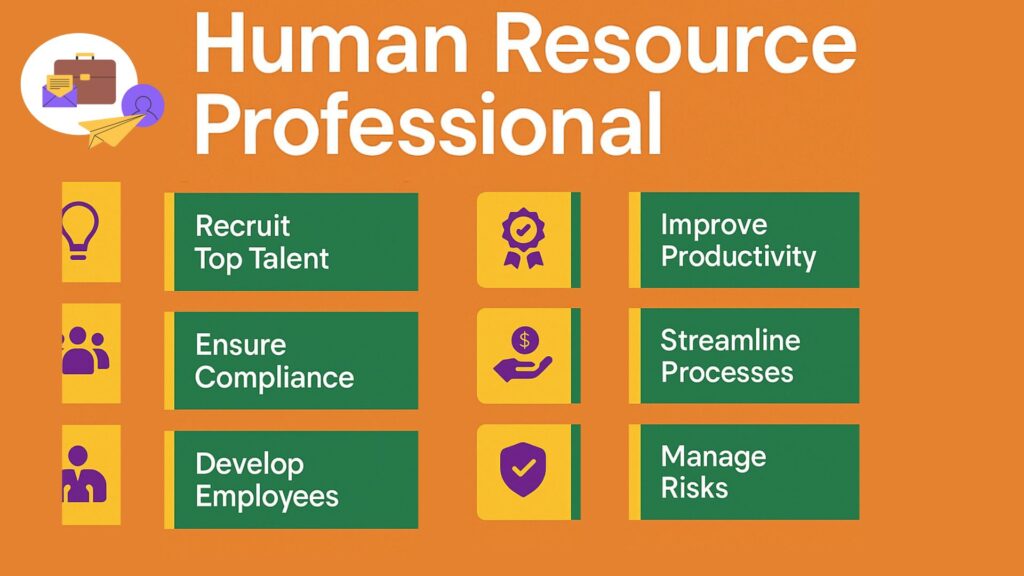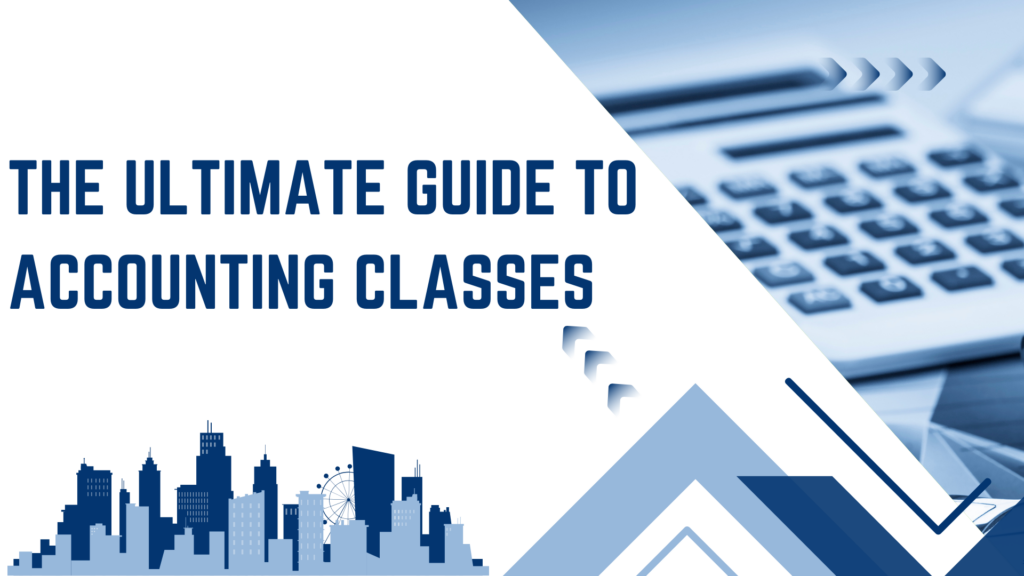HR Course After 12th: The Smart Move
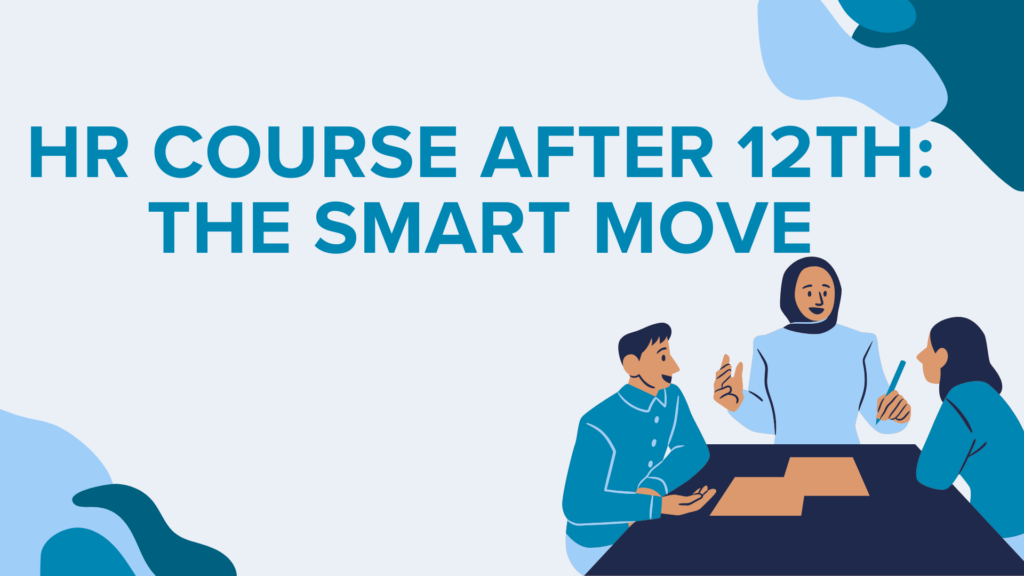
Table of Contents
Image of post regarding course
Introduction of HR course after 12th
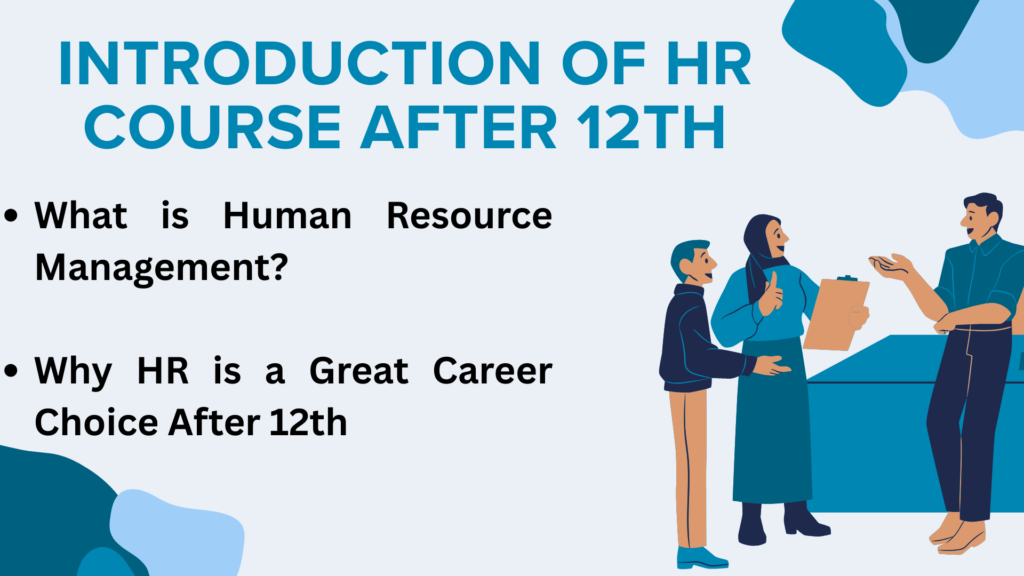
Choosing the right career after 12th can be overwhelming, right? If you’ve ever found yourself curious about people management, employee satisfaction, or workplace culture, then an HR course after 12th might just be the perfect stepping stone for your future. Let’s break down everything you need to know about this path—from courses to career opportunities—so you can decide if it’s the right fit for you.
What is Human Resource Management?
Human Resource Management (HRM) involves the strategic approach to managing an organization’s most valuable asset: its employees. HRM focuses on recruiting, training, employee relations, performance management, payroll, and ensuring that the company complies with labor laws. The primary goal is to create a positive workplace culture, boost productivity, and align the workforce with business objectives.
Why HR is a Great Career Choice After 12th
Is HR course after 12th a good choice for your career? Absolutely! HR is a dynamic and rewarding field that plays a pivotal role in any organization. By choosing to pursue an HR course after 12th, you open doors to a wide range of job roles across industries, such as recruitment, training, payroll management, and employee relations. With a steady demand for HR professionals globally, this field offers excellent growth opportunities and job stability. Whether through diploma, certificate, or degree programs, an HR course after 12th prepares you for a fulfilling and lucrative career in managing people and organizational culture.
Understanding the HR Field after 12th
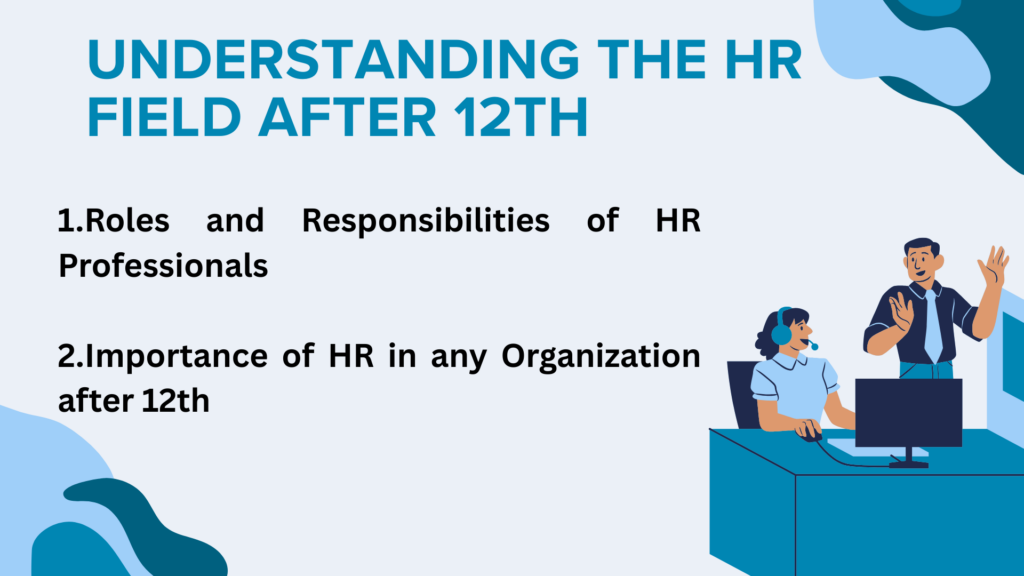
The HR field is a critical part of every organization, responsible for managing the most valuable resource—its employees. From recruitment to retention, HR professionals ensure that the workforce is engaged, productive, and aligned with the company’s goals. If you’re considering a career in this area, an HR course after 12th can provide the necessary skills and knowledge to step into this dynamic and rewarding profession.
1.Roles and Responsibilities of HR Professionals
2.Importance of HR in any Organization
1.Roles and Responsibilities of HR Professionals
Recruitment and Talent Acquisition
One of the primary responsibilities of HR professionals is to manage the hiring process. This includes posting job vacancies, reviewing resumes, conducting interviews, and selecting candidates for roles within the company.
After completing an HR course after 12th, you will be well-equipped to manage the recruitment process and source top talent for the organization.
Employee Onboarding and Orientation
HR professionals ensure that new employees feel welcomed and are properly onboarded into the company. They provide orientation, explain company policies, and facilitate training programs to help new hires integrate seamlessly into their roles.
Training and Development
HR is responsible for the training and development of employees. They identify skill gaps and organize workshops, seminars, and online courses to help employees improve their abilities and progress in their careers.
HR courses after 12th cover essential training techniques and development strategies to prepare professionals for this role.
Employee Relations and Conflict Resolution
A critical part of HR’s role is to manage employee relations. HR professionals are tasked with resolving workplace conflicts, ensuring a harmonious environment, and addressing employee grievances or concerns promptly and effectively.
Compensation and Benefits Management
HR handles the salary, bonuses, and benefits of employees. They are involved in designing competitive compensation packages and ensuring compliance with legal and regulatory requirements related to pay, tax deductions, and benefits.
Performance Management
HR professionals implement performance management systems to assess and evaluate employee performance. They provide feedback, help set performance goals, and develop strategies for improving productivity.
2.Importance of HR in any Organization after 12th
Human Resources (HR) plays a critical role in shaping and maintaining an organization’s structure and culture. After completing an HR course after 12th, you will realize how essential HR is in creating a productive, compliant, and positive work environment. Here are key reasons why HR is crucial for any organization:
Talent Acquisition and Retention
HR professionals are responsible for identifying and recruiting the best talent for the company. Through effective recruitment strategies, HR ensures that the organization has a skilled and diverse workforce. Moreover, HR plays a significant role in retaining employees by developing programs that ensure their satisfaction, engagement, and career growth.HR course after 12th provides the foundational knowledge to manage the recruitment cycle and retention strategies efficiently.
Employee Development and Training
HR ensures that employees receive continuous training and development opportunities. By investing in employee growth, organizations improve their overall efficiency and innovation. HR professionals identify training needs and create programs that help employees enhance their skills, adapt to new technologies, and prepare for leadership roles in the future.Performance Management
One of HR’s primary functions is to monitor and evaluate employee performance. By setting clear performance goals, HR ensures that employees are aligned with organizational objectives. Through regular feedback and performance appraisals, HR also identifies areas for improvement and rewards top performers, fostering a high-performance culture within the organization.Legal Compliance and Risk Management
HR ensures the organization complies with labor laws, workplace regulations, and safety standards. From adhering to minimum wage laws to managing employee benefits, HR professionals mitigate the risk of legal issues. They ensure fair treatment, prevent discrimination, and manage workplace disputes in accordance with the law.Fostering a Positive Work Environment
HR plays a key role in maintaining a healthy work culture. HR professionals promote diversity and inclusion, resolving conflicts and grievances between employees, and creating programs that boost employee morale. A positive workplace environment enhances job satisfaction and encourages teamwork, productivity, and loyalty.Strategic Alignment of Employees with Organizational Goals
HR helps ensure that employees’ goals align with the organization’s broader strategic objectives. Through talent management, employee engagement initiatives, and performance reviews, HR ensures that every individual contributes to the company’s success.
olffer image
Types of HR Courses After 12th
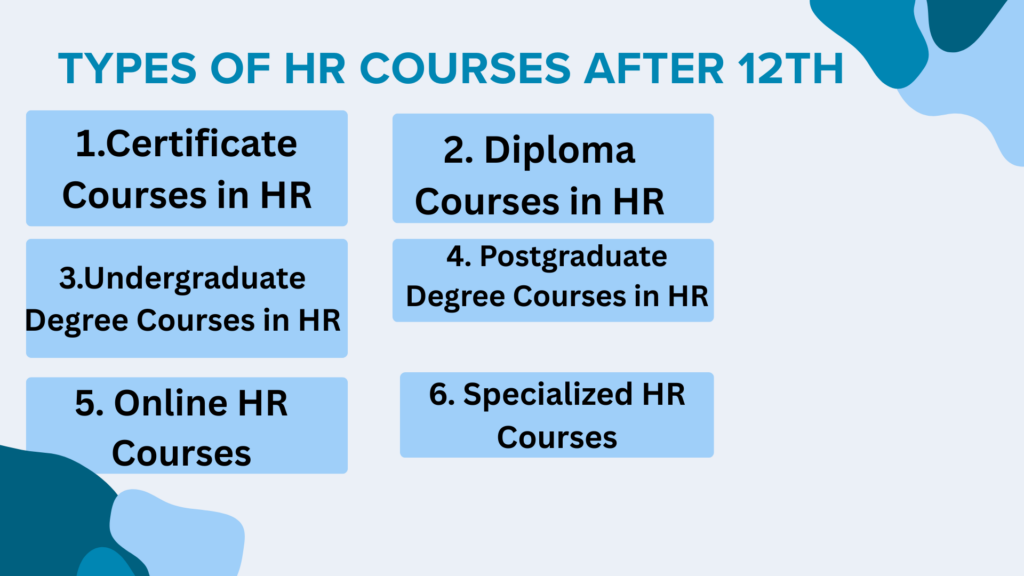
HR course suited for you. Here’s a detailed look at the different types of HR courses after 12th:
1. Certificate Courses in HR
Duration: 6 months to 1 year
Overview: Certificate HR courses are short-term programs that introduce students to the fundamentals of human resource management. These courses focus on basic HR concepts, employee relations, and recruitment processes.
Ideal for: Students who want to get started quickly in HR or those looking for entry-level positions.
Examples:
Certificate in HR Management
Certificate in Payroll Management
Certificate in Recruitment and Staffing
2. Diploma Courses in HR
Duration: 1 year
Overview: Diploma HR courses after 12th are more comprehensive than certificate programs. They provide students with a deeper understanding of HR operations, employee engagement, training, and labor laws.
Ideal for: Students who wish to acquire a foundational understanding of HR and seek mid-level HR roles.
Examples:
Diploma in Human Resource Management (HRM)
Diploma in Personnel Management
Diploma in Industrial Relations and Labour Laws
3. Undergraduate Degree Courses in HR
Duration: 3 years
Overview: An undergraduate degree in HR, such as BBA in HR or BA in Human Resource Management, provides an in-depth study of HR concepts, business practices, management theories, and organizational behavior. These programs prepare students for a variety of HR roles and managerial positions.
Ideal for: Students who want to pursue a long-term career in HR with managerial responsibilities.
Examples:
BBA in Human Resource Management
BA in Human Resource Management
B.Com in Human Resource Management
4. Postgraduate Degree Courses in HR
Duration: 2 years
Overview: Postgraduate HR courses after 12th typically require a Bachelor’s degree for admission, but some institutes offer integrated programs after 12th. These advanced courses provide specialized knowledge in HR practices, leadership, organizational development, strategic HR management, and advanced employee relations.
Ideal for: Students who wish to work in senior HR roles, management positions, or HR consulting.
Examples:
MBA in Human Resource Management
Postgraduate Diploma in Human Resource Management (PGDHRM)
Master of Human Resource Management (MHRM)
5. Online HR Courses
Duration: Varies (from 3 months to 1 year)
Overview: With the rise of online education, many platforms offer online HR courses after 12th that allow students to learn at their own pace. These courses cover a wide range of HR topics, such as HR operations, leadership, payroll management, and recruitment.
Ideal for: Students looking for flexibility in learning or those already working and wishing to gain HR expertise.
Examples:
Coursera HR Management Certification
Udemy HR Basics
LinkedIn Learning HR Certification
6. Specialized HR Courses
Duration: Varies
Overview: Specialized courses offer knowledge on specific HR functions, such as recruitment, payroll management, labor law, and employee training and development. These courses are often short-term and focused on practical skills.
Ideal for: Students who want to specialize in a particular aspect of HR, such as talent acquisition or employee engagement.
Examples:
Advanced Diploma in Payroll Management
Certification in Recruitment and Staffing
Training and Development Specialist Course
Eligibility Criteria for HR Courses After 12th
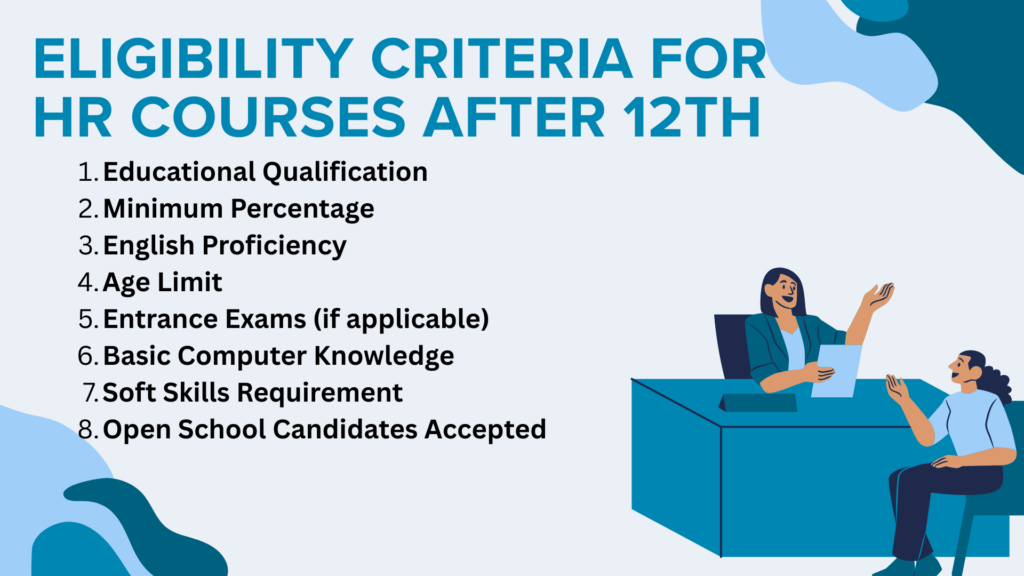
olffer image
Educational Qualification
The primary requirement is passing 10+2 (any stream: Arts, Commerce, or Science) from a recognized board.
Minimum Percentage
Most institutes require a minimum of 45% to 50% marks in 12th grade. Some top colleges may demand higher scores.
English Proficiency
Since HR involves communication, basic proficiency in English (speaking, writing, and reading) is often preferred.
Age Limit
Generally, there is no strict age limit, but most students start HR courses between the ages of 17 to 20.
Entrance Exams (if applicable)
Some degree-level courses like BBA in HR may require entrance exams such as CUET, IPMAT, or institute-specific tests.
Basic Computer Knowledge
For certificate or diploma HR courses, basic computer skills are often desirable since HR tasks involve software tools.
Soft Skills Requirement
Institutes may prefer students with good interpersonal skills, leadership qualities, or a basic understanding of business ethics.
Open School Candidates Accepted
Many private and government-recognized institutes accept students from open schooling backgrounds as well.
Duration for HR Course After 12th
Certificate Courses in HR
Duration: 3 to 6 months
Ideal for quick skill development and entry-level HR jobs.
Diploma in Human Resource Management
Duration: 6 months to 1 year
Offers a solid foundation in HR concepts and practical skills.
BBA in Human Resource Management
Duration: 3 years
A full-time undergraduate program with a focus on business and HR.
BA in Human Resource Management
Duration: 3 years
Focuses more on the theoretical and psychological aspects of HR.
Integrated MBA in HR (BBA + MBA)
Duration: 5 years
Combines undergraduate and postgraduate studies for a complete HR career path.
Online HR Certification Courses (MOOCs)
Duration: 1 week to 6 months (self-paced)
Offered by platforms like Coursera, Udemy, and edX.
Admission Process in HR Course After 12th
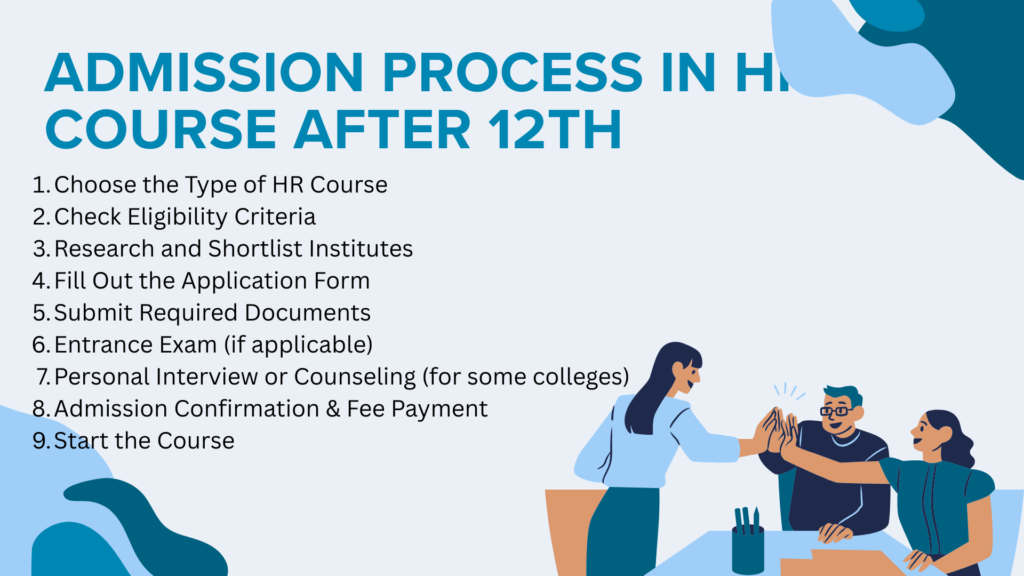
Choose the Type of HR Course
Decide between certificate, diploma, or degree programs based on your career goals and time availability.
Check Eligibility Criteria
Ensure you have passed 10+2 from a recognized board and meet the minimum percentage requirement (usually 45–50%).
Research and Shortlist Institutes
Look for recognized colleges, universities, or online platforms offering HR courses after 12th.
Fill Out the Application Form
Visit the official website of the institute and complete the online or offline application form before the deadline.
Submit Required Documents
Prepare and upload/scanned copies of documents like:
10th & 12th mark sheets
ID proof
Passport-sized photographs
Transfer or migration certificate (if applicable)
Entrance Exam (if applicable)
Some institutes may require an entrance test (e.g., CUET, IPMAT, or institute-level tests) for degree courses like BBA HR.
Personal Interview or Counseling (for some colleges)
You may be called for a personal interview, group discussion, or counseling session after clearing the entrance exam.
Admission Confirmation & Fee Payment
Once selected, confirm your seat by paying the admission fee and submitting the required documents.
Start the Course
Attend the orientation and begin your HR course as per the academic calendar.
6.Job Roles After Completing HR Course
HR Executive
Handles basic HR functions like recruitment, onboarding, and employee records management.
Recruitment Specialist
Focuses on sourcing, screening, and hiring suitable candidates for various job roles.
Payroll Executive
Manages employee salary processing, deductions, taxes, and payslip generation.
HR Assistant
Provides support to the HR department in administrative tasks and employee coordination.
Training and Development Coordinator
Organizes employee training sessions and development programs to enhance workforce skills.
Employee Relations Officer
Maintains a healthy work environment and handles employee grievances and conflict resolution.
HR Coordinator
Coordinates between departments, schedules interviews, and supports HR operations.
Talent Acquisition Executive
Specializes in identifying and acquiring top talent for key organizational roles.
Future Scope of HR Course after 12th
High Demand Across Industries
Every organization—whether in IT, healthcare, hospitality, education, banking, or manufacturing—needs skilled HR professionals. This consistent demand creates stable and long-term career opportunities in HR.
Career Growth from Executive to Leadership Roles
With experience and additional qualifications (like MBA in HR or HR certifications), students can grow from HR Assistant to HR Manager, Director of HR, and even Chief Human Resource Officer (CHRO).
Opportunities in Global Job Market
HR professionals are in demand globally. Completing an HR course can lead to international opportunities in countries like Canada, UAE, UK, and Australia—especially with certifications like SHRM, HRCI, or CIPD.
Entry Into Specialized HR Fields
The future of HR is becoming more specialized. Students can move into roles such as:
HR Analytics Specialist
Talent Management Expert
Organizational Development Consultant
HR Tech and Automation Consultant
Employee Engagement Manager
Integration with Technology (HR Tech)
The future of HR involves tools like HRIS, AI-driven recruitment software, payroll automation, and data analytics. Learning these tools opens up advanced career paths and boosts employability.
Scope in Startups and Small Businesses
Startups increasingly look for multi-skilled HR professionals who can handle hiring, compliance, training, and payroll—creating wider job roles even at early career levels.

